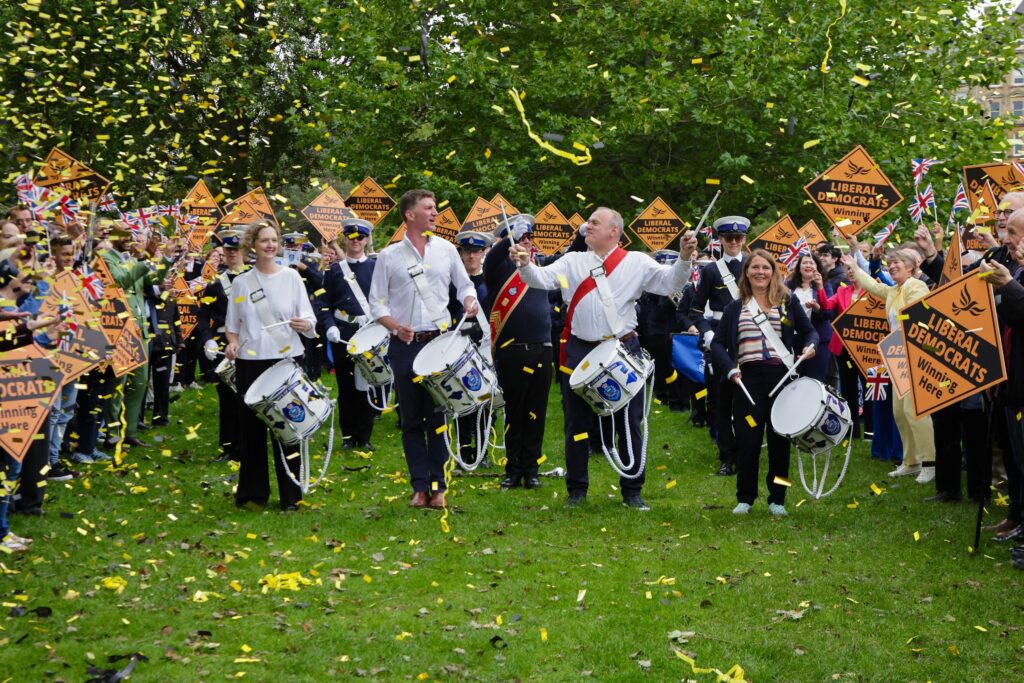Liberal Democrat leader Ed Davey joined Politics UK editor Max Booth on the windswept sands of Bournemouth beach today amidst the Liberal Democrat conference.
Bundled against the coastal chill, Davey spoke with the unvarnished, clipped rigour that has become his trademark, meticulously addressing the party’s vision.
The setting was the living embodiment of theatre in modern politics; a microcosm of the balancing act faced by a centrist, yellow cladded liberal party hoping to carve out relevance and influence amidst the larger-than-life personalities of the global stage, and not fall prey to electoral obsolescence in an increasingly deglobalised order.
Earlier this week, Davey boycotted King Charles’s state banquet held in honour of no less theatrical a figure of Donald Trump to protest against the US president’s failure to intervene decisively to end the war in Gaza.
When asked whom he’d most prefer to be on a desert island with out of Farage, Trump or Elon Musk, Davey made no secret of his disapproval of the American president in his interview.
He spoke of the personal benefits he could glean from fleeing the island as quickly as possible when he said “my swimming would improve with any of them. I’d be off that island quick”.
Trump unsurprisingly lost his favourability contest, however – his age cited as the prize-winning condition: “Trump is the oldest and so he wouldn’t last very long.”
The Liberal Democrats, however, have made seismic leaps forward locally – gaining more council seats than the Conservatives or Labour, and coupled with a 64 seat increase in the 2024 election from 2019, potential future premiership at the head of a coalition is a serious conversation for the leader.
When asked whether he’s given coalition arrangements much thought, he declined, arguing instead that former Liberal Democrat leaders “spent quite a lot of time worrying about what happens after the election. I don’t think that works.” Insisting it’s preferential to “persuade people to your standards that the Liberal Democrats are a party of change.”
Of course, a party serious about premiership must also not shirk from the realities of foreign policy – especially that of the Transatlantic special relationship, in which Starmer has taken centre stage.
Vocal scrutiny of the US Republican party when in opposition is a task far easier than when at the helm of the British government; when asked whether being in government would change his relationship with Trump he acknowledged the importance of engagement, however that the question is rather “how you engage.”
“Starmer is too soft,” he noted, before commending the roles that the Australian and Canadian Liberal parties have played in “standing up to him.”
Giving a brief guide on how this ought to be achieved, Davey argued an “alternative strategy is needed,” as well as, what he refers to, as an “economic coalition of the willing.”
An ambiguous term, the “coalition of the willing” is a phrase from the early 2000s, used by George W. Bush to describe the group of countries that backed the U.S. invasion of Iraq. It’s become shorthand for a group of like-minded consociates acting in unison outside of formal structures like the UN or WTO; essentially a loose alliance of democracies that can present a united economic front against protectionism, or Trump’s artillery of tariffs.
Davey represents the horde of middle-class, star-studded blue flag waving, London professionals that once believed Trump and the MAGA movement to be an aberration of a backwards wasteland of quintessentially foreign politics.
That Hillary had won the popular vote, they uttered to themselves, was evidence that America would come good; the Electoral College was an archaic hurdle to an otherwise sweeping liberal fervour. But Trump has taken the reins of yet another presidency, protectionism is back, and the Anglosphere liberal existential dread is now etched into reality.
In his interview, this stereotype of an out of touch, Oxbridge PPE graduate in all of the Kumbaya cadences of parochial Middle England was borne out. Elaborating on what he meant by calling Farage a “plastic patriot” he said “he tries to claim he’s in touch with British values, he’s not.
“He promotes American values more… he wants to bring American values here.”
What he’s forgetting, of course, is that Farage’s support base in the UK has increasingly glanced across the Atlantic in admiration – and there’s a reason for this.
In April this year, Trump hosted a cohort of miners in the White House, embodying an odd contradiction of traditionally ordinary, blue collar and laborious professionals; hard hats and work-stained hands set against gilded chandeliers and marble floors.
To try and connect the blue-collar grit of everyday labor colliding with the extravagant pomp of tariff policy, Trump did surprisingly well.
It’s a curious parallel with Farage himself: A privately educated, posh boy, perennially clad in tailor-made suits, yet somehow he has captured the hearts and minds (and votes) of the industrial northern Red Wall.
Speaking further on Trump, he stated his “main concern is his impact on my constituents, from what he’s doing with trade, from what he’s doing on defence and security.”
For him, Trump is a threat to two of those linchpin aims of his party: Being “strong on growing the economy through trade,” as well as being “convinced that we need to invest in our defence to protect our economy,” upon which Trump’s policies “undermines both of those.”
For the Liberal Democrats, the lesson isn’t to copy Trump, but to recognise that action matters as much as rhetoric. Sure, Davey’s criticisms of Trump through the blindsided lenses of his suburban London constituency and Farage as an Americanised acolyte, but if he is serious as he says he is about premiership, he needs to look further across “our great country” in which he bids to “win more seats.”
Thus, when Starmer told The Telegraph earlier this year that “globalisation was over” it emanated a more convincing feeling of a lament of a globalised order that looked once eastward, rather than a declaration of a political class who could have capitalised on, or even took inspiration from, Trump’s glinting ascent which was followed by a resurgence of economic nationalism, and a reminder that bold action – not caution – often wins voters’ attention.
Watch the full interview below:
🚨🎥 WATCH: Our interview with Ed Davey at Lib Dem conference
— Politics UK (@PolitlcsUK) September 21, 2025
– Farage "promotes American values more" than British
– Admires Canada's Mark Carney the most out of all world leaders
– Not thinking about coalitions
– Lib Dems "really going to do well" in 2029 election pic.twitter.com/5PG2M4zP1c
Featured image via Ed Davey on X.


